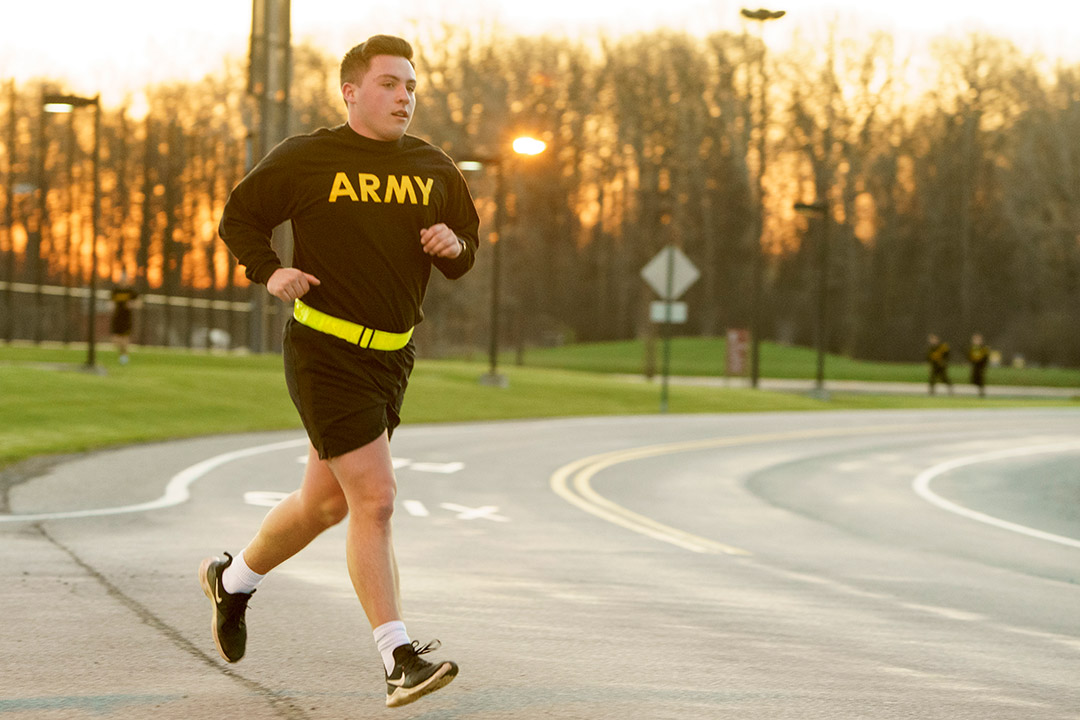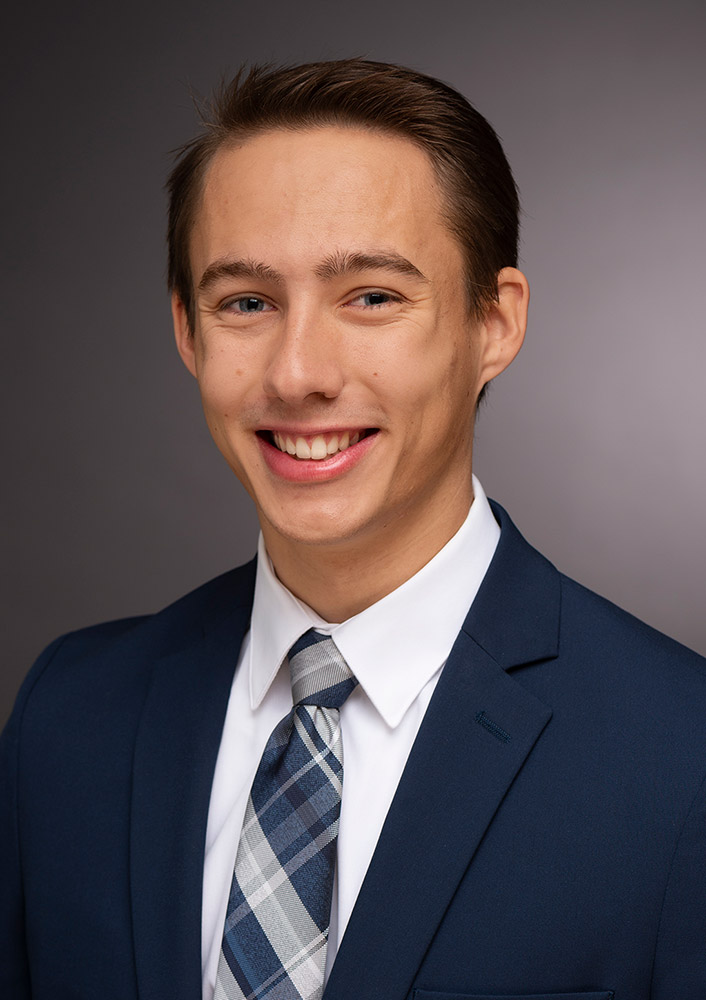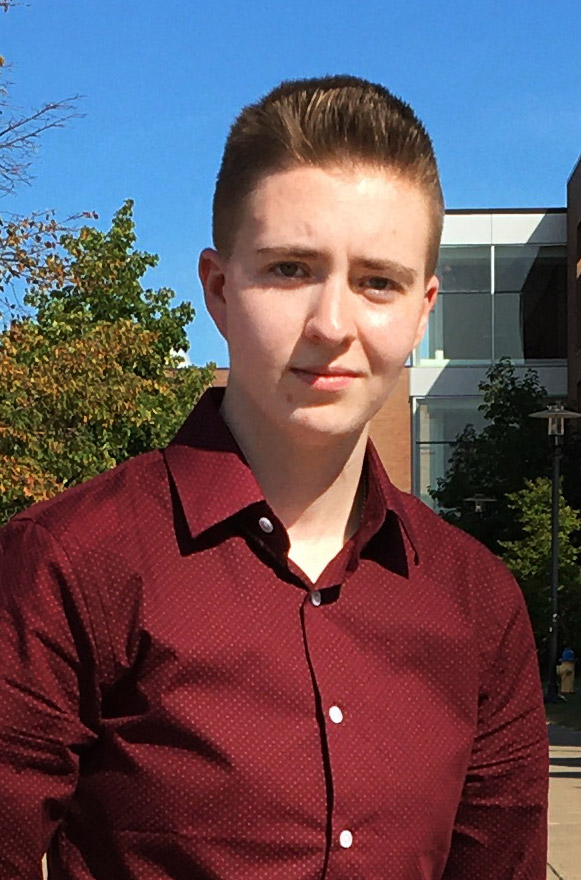Community service informs career paths for graduating students
Scott Hamilton
Michael Healey has combined biomedical sciences with military studies in RIT’s Army ROTC program and led several volunteer leadership experiences during his academic career. He’ll graduate this May and begin service with the Army’s Medical Services Corps.
When the U.S. left Afghanistan after 20 years, many refugees from the country sought new homes and resettled, some with just the clothes on their back. Michael Healey and his RIT Army and Air Force ROTC colleagues rallied and provided housewares and more than $1,600 in donations to those who were settling in Rochester.
Read more about the Class of 2022
RIT’s graduates shape the future and improve the world through creativity and innovation. Our graduates are leveraging the power of technology, the arts, and design for the greater good. See how they are doing it and what is next for them.
Helping others has been a key component for Healey at RIT. The biomedical sciences student, like other graduates, will draw upon that foundation of community service in his career.
When he is commissioned as a second lieutenant in the U.S. Army this May, Healey will begin service with its Medical Service Corps, one step closer to his goal of being a physician.
Since he was a freshman, Healey has combined coursework in sciences with volunteer work in Rochester General Hospital’s emergency department as a patient care technician.
“This has been the most amazing experience I could have working alongside the amazing nurses and physicians who save the lives of countless people every day,” he said. “When the pandemic began, I knew I had to step up and go to work. Through the many losses I witnessed, this is the one memory that I’ll never leave behind, working at the epicenter of the COVID-19 pandemic.”
Healey also successfully juggled work as president of the RIT Global Health Association, leading activities with the Theta Chi Fraternity and with responsibilities as Interfraternity president. He even had time for club rugby.
During the pandemic, Ryan Brown also stepped up in his hometown of Lehigh Valley, Pa., by 3D-printing facial masks for St. Luke’s Hospital.
Ryan Brown helped in his hometown 3D printing masks for St. Luke’s Hospital during the pandemic. The mechanical engineering major also volunteered and led several Alternative Spring Break programs in the U.S. and abroad throughout his time at RIT.
“He leveraged his mechanical engineering talents in a COVID response and completed a tremendous amount of service, including RIT projects such as Framing Frenzy, a Habitat for Humanity initiative, and our Alternative Spring Break (ASB) program,” said Kathryn Cilano, director of RIT’s Center for Leadership and Civic Engagement. “I cannot speak highly enough of this emerging leader.”
Brown participated in four years of ASB activities supporting disaster relief, wetland restoration, and urban environmental preservation efforts in places like San Juan, Puerto Rico, and New Orleans.
During the trip to Puerto Rico in 2019 shortly after it was devastated by Hurricane Dorian, Brown and a team of students worked with Para La Naturaleza, a sustainable community initiative, over two days helping repair a school damaged and abandoned.
“It was 12 hours of work, if that, and when we left, the principal thanked us. As our bus was pulling away, she turned around, and she was crying,” he said. “It was one of those moments, just think about the things you spend 12 hours on. That 12 hours brought someone to tears. It was a turning point for me in thinking about how impactful some work can really be to people.”
Brown will begin work at Radius Engineering in Salt Lake City, collaborating on the company’s composite materials development projects for the aerospace industry.
“The mixture of mechanical engineering and service is something I have been seeking for a while, and it’s more challenging than I thought,” he said. “As a mechanical engineer, I have a special set of skills and I can do my part in a bunch of different ways, and maybe it’s not Alternative Spring Break, but it’s making things more efficient or reducing carbon emissions or just considering sustainable alternatives of design as I do my job.”
Using skills and doing her part also drives Allison Pavlock.
Allison Pavlock will graduate with a double major in criminal justice and sociology this May. Her goal is to use her degrees and community service experience to continue advocacy in a restorative justice role in the community.
Service was part of her upbringing. Her grandparents were missionaries and her parents followed suit with volunteer activities in their hometown. A sociology course as an undergraduate was an “ah-ha” moment for Allison, and she enjoyed learning about different communities of people, their customs, and traditions.
“Coming to RIT was challenging and very enlightening,” said the transfer student from Northern Pennsylvania Regional College. “There are so many people, different cultures, different lifestyles. It was great for me to be able to immerse myself in that while learning about it as well.”
She will graduate with a double major in criminal justice and sociology.
This spring semester she interned with Rochester’s Society for Protection and Care of Children, contributing technical skills so common to Gen Z, improving its website, as well as targeting public policy issues for constituents. This work, as well as experience in the military prior to coming to RIT, positions Pavlock well for the restorative justice responsibilities she is seeking.
“This work is completely overlooked,” she said. “More people look for jobs where they will be making a lot of money, but through my work in sociology, I’ve seen that society only works when we all are able to figure out what is the most helpful to other people. Being someone that is a part of that movement is not only extremely important to me personally, but to society and the community I can be impacting.”





